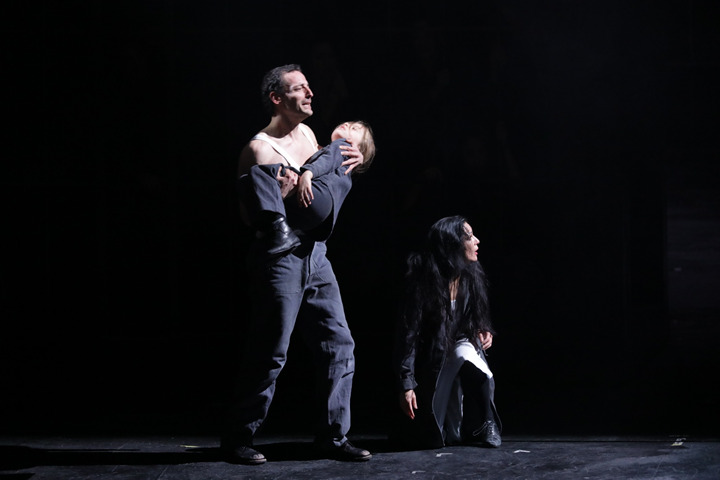| Opera Reviews | 30 April 2024 |
Vocal excellence makes up for a disappointing productionby Silvia Luraghi |
|
Rossini: Guillaume Tell |
|
 |
|
|
Gioacchino Rossini’s monumental last opera, Guillaume Tell, is being performed for the first time in the original French at Milan’s Teatro alla Scala. Even considering the Italian version, this opera cannot be said to be a frequent feature on the Milanese stage, especially in the 20th century. Its last appearance dates back to 1988, when Riccardo Muti, at that time the company’s music director, chose it as season opener. This year's production features no less than the Maestro’s daughter, Chiara Muti, as stage director, in what can ideally be viewed as a sort of dynastic continuity. For her first time at La Scala, Chiara Muti opted for an unconventional interpretation of the opera. Rather than showing the habitual Swiss countryside setting, the director, supported by set designer Alessandro Camera and costume designer Ursula Patzak, staged the action in a sort of dystopic ambience, with giant black scaffolding surrounding the stage, dim lights and anonymous gray costumes. In this dark environment, the only spot of color at the end of the first act is Gesler appearing high on the stage. The tempest in the fourth act is represented by white cloth, with the death on a boat holding the sickle. Nature, which is so dominant not only in the plot but especially in the score, has no place in the director’s concept. Only in the end does it appear in the background, when light finally breaks out and the people express joy for gaining freedom by taking off their gray costumes and revealing white underwear. At the press conference Chiara Muti said that she was inspired by Fritz Lang’s renowned film Metropolis, and wanted to highlight how the people were being oppressed and possibly manipulated (indeed they kept looking at their tablets, suggesting some sort of technological control). Also inspired by cinema was the death with the sickle - Muti hinted to Bergman’s Seventh Seal. The production received heavy criticism and negative reactions from the audience at opening night, even after the end of the first act. Fortunately, the musical side was much more compelling. The vocal cast was let by bass Michele Pertusi in the title role, who gave a deeply carved, vocally flawless interpretation of the Swiss archer. Vocally and theatrically very convincing also was tenor Dmitry Korchak, who dominated the demanding score apparently without effort. Soprano Salome Jicia as Mathilde was perhaps somewhat at odds with the vocal side of her role, but was still able to portray a multifaceted character. Soprano Catherine Trottmann was a youthful Jemmy, and soprano Géraldine Chauvet gave an authoritative sound to Tell’s wife Hedwige. The chorus, that has an important role in this opera, was outstanding. The opera was conducted by Michele Mariotti, who was the real hero of the production. His reading of the score highlighted its complex character, measuring the volume and choosing tempi that allowed the unfolding of the music in harmony with the exposition of the action, gaining enthusiasm from the audience. In spite of some minor cuts and an early curtain at 6.30 p.m., the production ends at almost midnight; perhaps scheduling at least one matinée of this opera, which is also quite demanding for the audience, would have been a good idea. The second performance started with a minute of silence to the memory of Maurizio Pollini, a native of Milan, whose death had been announced earlier in the day. General Manager Dominique Meyer announced that Pollini's chapel of rest will be held at La Scala on Tuesday.
|
|
| Text ©
Silvia Luraghi Photo Brescia e Amisano © Teatro alla Scala |
|







